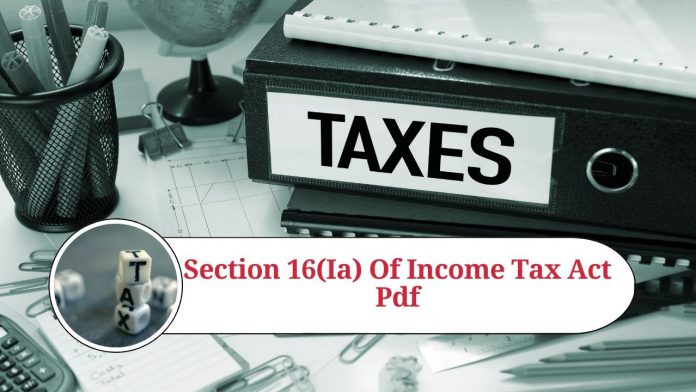The Income Tax Act, of 1961, is a comprehensive piece of legislation that governs taxation in India. Section 16(a) is one of the important provisions of the Act that deals with the taxation of perquisites provided by employers to employees. This article aims to provide a detailed understanding of Section 16(a) and its implications for both employers and employees.
What is Section 16(a) of the Income Tax Act?
Section 16(a) of the Income Tax Act deals with the taxation of perquisites provided by employers to employees. Perquisites are any additional benefits or facilities provided by the employer to the employee in addition to their regular salary or wages. These may include things like housing or vehicle allowances, reimbursements for medical expenses, or even stock options.
According to Section 16(a), perquisites provided by the employer to the employee are taxable under the head “Salaries”. The value of perquisites is calculated based on the cost to the employer and is added to the employee’s taxable income for the year.
Implications for Employers:
Employers are responsible for calculating the value of perquisites provided to their employees and deducting the appropriate amount of tax from their salaries. Failure to do so can result in penalties and fines from the tax authorities.
Employers also need to maintain proper records of the perquisites provided to employees and provide these details in Form 16 issued to employees at the end of the financial year.
Implications for Employees:
Employees need to be aware that perquisites provided by their employer are taxable and will be added to their taxable income. This means that they will have to pay tax on the value of the perquisites received.
However, certain perquisites are exempt from tax under certain conditions. For example, the value of rent-free accommodation provided by the employer is exempt from tax up to a certain limit, and medical reimbursements are exempt up to a certain amount.
Employees can also claim deductions for certain expenses incurred about the perquisites provided by their employer. For example, they can claim deductions for the interest paid on a housing loan for the property they are occupying, which is provided by the employer.
Applicability of Section 16(ia):
Section 16(a) applies to all employees, whether they are salaried or self-employed. However, it does not apply to certain categories of employees, such as government employees or employees of certain public sector undertakings.
Conclusion:
Section 16(a) of the Income Tax Act is an important provision that governs the taxation of perquisites provided by employers to employees. Employers need to be aware of their responsibilities in calculating and deducting tax on perquisites, while employees need to be aware of the tax implications of the perquisites they receive. Understanding the provisions of Section 16(a) can help employers and employees stay compliant with the tax laws and avoid penalties and fines.
Read more useful content:
- section 145 of income tax act
- section 10e of income tax act
- section 9 of the income tax act
- section 94b of income tax act
- section 206aa of income tax act
Frequently Asked Questions:
What are perquisites?
Perquisites are any additional benefits or facilities provided by the employer to the employee in addition to their regular salary or wages. These may include things like housing or vehicle allowances, reimbursements for medical expenses, or even stock options.
What is Section 16(a) of the Income Tax Act?
Section 16(a) of the Income Tax Act deals with the taxation of perquisites provided by employers to employees. It states that perquisites provided by the employer to the employee are taxable under the head “Salaries”.
How are perquisites taxed?
The value of perquisites is calculated based on the cost to the employer and is added to the employee’s taxable income for the year. The employee is then required to pay tax on the value of the perquisites received.
Are all perquisites taxable?
No, certain perquisites are exempt from tax under certain conditions. For example, the value of rent-free accommodation provided by the employer is exempt from tax up to a certain limit, and medical reimbursements are exempt up to a certain amount.
Who is responsible for calculating and deducting tax on perquisites?
Employers are responsible for calculating the value of perquisites provided to their employees and deducting the appropriate amount of tax from their salaries.
Are there any penalties for non-compliance with Section 16(a)?
Yes, failure to comply with the provisions of Section 16(a) can result in penalties and fines from the tax authorities.
Does Section 16(a) apply to all employees?
Section 16(a) applies to all employees, whether they are salaried or self-employed. However, it does not apply to certain categories of employees, such as government employees or employees of certain public sector undertakings.
How can employees claim deductions for expenses related to perquisites?
Employees can claim deductions for certain expenses incurred about the perquisites provided by their employer. For example, they can claim deductions for the interest paid on a housing loan for the property they are occupying, which is provided by the employer.
What is Form 16?
Form 16 is a certificate issued by the employer to the employee at the end of the financial year. It contains details of the employee’s salary, tax deducted by the employer, and any perquisites provided to the employee during the year.




















